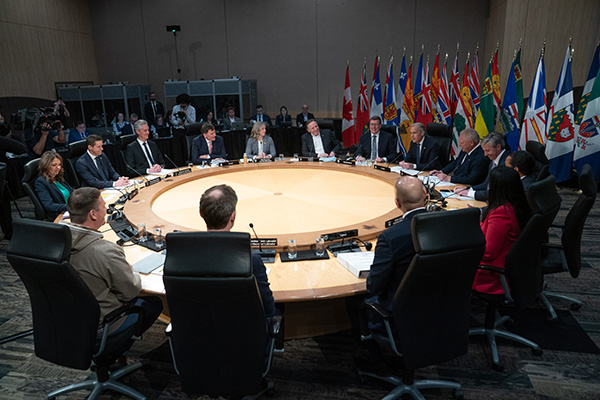Intergovernmental relations in the Canadian context
The importance of intergovernmental relations
Managing intergovernmental relations is an important aspect of Canadian federalism. Canada has strong, autonomous orders of government and many public policy issues involve different levels of government. Intergovernmental relations are key to coordinating government responses to effectively address the needs of Canadians.
Canada, like most federations, has not formally anchored its intergovernmental structures and processes in its Constitution. Rather, protocols and conventions have developed over time through the practice of intergovernmental relations, continuously shaping expectations and approaches in response to changing needs.
Intergovernmental relations in Canada focus on relations among federal, provincial and territorial executives - the Prime Minister, Premiers, Ministers, and senior officials. These relationships facilitate the exchange of information, consultations, negotiations, and consensus-building which enables governments to collaborate and work together to deliver results for Canadians.
Responsibility for intergovernmental relations
Given the political and policy importance of intergovernmental relations, overall responsibility is normally assumed by the federal Prime Minister and provincial/territorial Premiers. The federal Prime Minister is assisted by the Minister of Intergovernmental Affairs, and is supported by a secretariat within the Privy Council Office. Provinces and territories have either a department, a secretariat or a coordinating unit within the Executive Office responsible for intergovernmental relations.
Forums for intergovernmental cooperation
While the Constitution does not include reference to intergovernmental relations, there are many areas of common interest and overlap. This is why effective intergovernmental cooperation is vital in a modern federation like Canada.
Intergovernmental fora support multilateral engagement and collaboration. With a collective interest in better serving Canadians, multilateral meetings help governments to mitigate risks of duplication, address areas of conflict and identify ways to work more effectively together.
First Ministers conferences

Prime Minister Mark Carney and Canada’s First Ministers meet in Saskatoon, Saskatchewan on June 2, 2025
First Ministers Meetings (FMMs) bring together Canada's most senior political leaders, the Prime Minister and provincial and territorial Premiers, to discuss matters of national significance. These meetings look to foster frank and constructive exchange and any decisions taken at an FMM must be made by consensus.
FMMs can be focused on immediate issues, such as tariffs, or on recurring national priorities, like removing internal trade barriers. FMMs are often preceded by a meeting between First Ministers and National Indigenous leaders to ensure that these discussions are informed by Indigenous perspectives.
Ministerial meetings
Much of the work in intergovernmental relations takes place in the councils or forums of Federal, Provincial and Territorial Ministers responsible for advancing cooperation in specific policy sectors. Most of these meetings take place at regular intervals, including for example the:
- Committee on Internal Trade
- Forum of Labour Market Ministers
- Canadian Association of Administrators of Labour Legislation
- Council of Ministers Responsible for Transportation and Highway Safety
- Canadian Council of Forest Ministers
- Forum of Ministers Responsible for Immigration
- Canadian Council of Ministers of the Environment
- Ministers’ Council on the Canadian Francophonie
Regular engagement in these multilateral forums is critical to foster cooperation between federal, provincial and territorial governments faced with common policy challenges or that require coordination over implementation. For example, criminal law is an area of federal jurisdiction, which means Parliament is not required to consult provinces and territories before amending the Criminal Code. However, provinces and territories are responsible for the administration of justice. Most law enforcement is conducted by municipal and provincial police forces, and trials for criminal offences begin in lower courts administered by provinces and territories. Consequently, the provincial and territorial administration of justice is directly impacted by federal changes to the Criminal Code. Federal, provincial and territorial officials responsible for justice and public safety must therefore collaborate to ensure the efficiency and fairness of the criminal justice system.
Some multilateral forums have become institutionalized, with regular meetings, often co-chaired by federal and provincial ministers, and with strong bureaucratic support. Several councils and forums are making efforts to advance the inclusion of Indigenous representation, including through the participation of national and regional Indigenous organizations in some of their meetings.
Officials' meetings
In addition to meetings at the political level, other meetings, formal and informal, are held among deputy ministers and/or other senior officials. These may be bilateral or multilateral.
The Canadian Intergovernmental Conference Secretariat (CICS)
Most intergovernmental meetings are served by the Canadian Intergovernmental Conference Secretariat (CICS). It provides the logistical support for organizing conferences, distributing documents and press releases. It does not have a policy advisory role.
CICS was created in 1973 by the First Ministers. Governments recognized, at that time, a need for a mechanism to support conferences of First Ministers and a growing number of intergovernmental meetings on a continuing basis. It is an agency of the federal and provincial governments and is supported by these two orders of government. Its staff is also selected from both federal and provincial governments.
CICS reports to Parliament through the Minister of Intergovernmental Affairs.
Federal/Provincial/Territorial (FPT) agreements
One of the first federal-provincial agreements dates back to 1868. It dealt with immigration, a constitutional power shared between the Parliament of Canada and the provincial legislatures. Federal-Provincial agreements (and more recently, Federal-Provincial/Territorial agreements) have since multiplied.
The increasing role of governments have required them to enter into agreements in relation to many activities, whether of federal, provincial or shared jurisdiction. In fact, most changes to the respective roles and responsibilities of each order of government happens through intergovernmental agreements, rather than constitutional change. Today, Federal-Provincial/Territorial agreements constitute an important element of our federal governance.